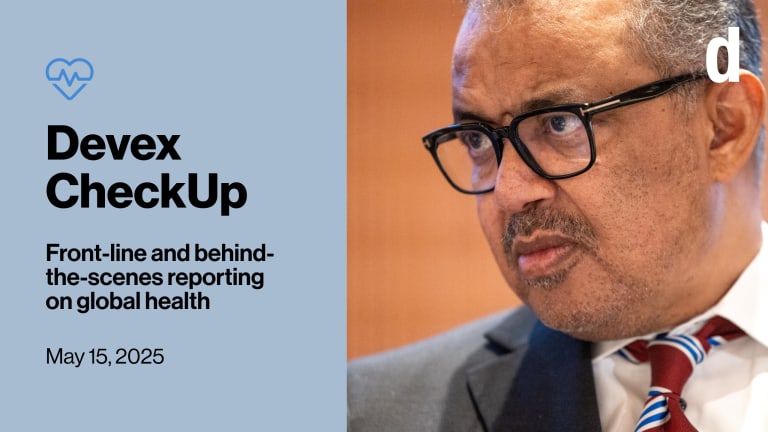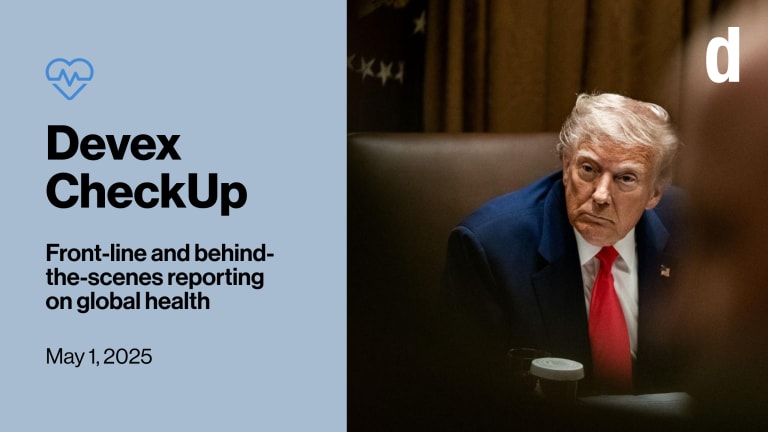
Only 4.8% of Kenya’s population is fully vaccinated against COVID-19, slightly lower than Africa’s average of 5.2%. That’s largely due to the limited number of doses and their sporadic distribution, but vaccine hesitancy is also a problem the country is facing — an August survey found 36% of Kenyans are unsure about the shot — and misinformation is a big driver of that.
This is a preview of Devex CheckUp
Sign up to this newsletter for exclusive global health news and insider insights, in your inbox every Thursday.
• Zakiya Abbas, a 57-year-old woman who has hypertension, soured on the vaccine when her neighbors told her it would worsen her condition. That contradicts WHO’s view that vaccination is particularly urgent for people with comorbidities.
• Vaccine hesitancy in high-income countries has also influenced others not to take the jab. “If some Americans are refusing to get the vaccine — then we are also worried,” says 60-year-old Nassur Mohamed. However, he says he might consider getting vaccinated if more information on the different types of COVID-19 inoculation becomes available.
• In fact, hesitancy is higher in high-income countries: A survey this summer found that 80% of people in low- and middle-income countries polled wanted the vaccine, compared with 65% of Americans. And it varies wildly across Africa. A survey from Africa CDC released in March found that 94% of respondents in Ethiopia were willing to take a vaccine, but in the Democratic Republic of Congo it was 59%.
• Though blood clots linked to the AstraZeneca vaccine are rare — rarer, doctors emphasize, than in COVID-19 patients — news about them has also led people to skip it. Nairobi residents tell Sara Jerving and Ali Ibrahim that messaging around vaccines is confusing, contradictory, and alarming — and that maybe if they received better information it might convince them to take the shot.
• But supply remains a greater issue than hesitancy. Across Africa, only 252.5 million doses have been made available, according to data from Africa CDC. Of that figure, just 176.6 million have been administered to date, accounting for less than 3% of the 6.72 billion doses administered globally.
• During a Thursday press briefing, Africa CDC Director Dr. John Nkengasong said the African Union would announce in the coming days a new deal for doses of Moderna’s COVID-19 vaccine. The AU currently only has a deal with Johnson & Johnson for countries to purchase its vaccines through the African Vaccine Acquisition Trust.
Read more: Conflicting information drives COVID-19 vaccine hesitancy in Nairobi
ICYMI: Over 70% of African nations didn't reach global COVID-19 vaccine goal
Home visits
On Nov. 8, polio vaccination campaigns are scheduled to begin in Afghanistan, with the expectation of reaching all children across the country. The Taliban have agreed to support house-to-house polio vaccination after banning it for more than three years in areas under their control.
WHO and its partners now need to reengage vaccinators; assess safety concerns, particularly for female members of the health workforce; and ensure a reliable mechanism for paying front-line workers, says Dr. Hamid Jafari, director of polio eradication at WHO eastern Mediterranean region.
Read more: Taliban to restart house-to-house polio vaccinations in Afghanistan
Sputnik V vs. Pfizer
A U.S. study published in The Lancet this month assessed the effectiveness of Pfizer’s COVID-19 vaccine over the first few months following full immunization. While the findings did reveal that effectiveness against COVID-19 infections declined to 47% after five months, it remained highly effective at preventing hospitalization due to the delta variant.
The research says ...
Interim results from a new study, presented at this week’s 52nd Union World Conference on Lung Health, showed that a prototype fingerstick blood test holds promise as a screening tool for tuberculosis. Developed by Cepheid, the technology gives results in under one hour using just a few drops of blood, and it meets WHO’s minimum specifications for a TB triage test.
Meanwhile, Médecins Sans Frontières found that an oral, six-month treatment regimen using bedaquiline, pretomanid, linezolid, and moxifloxacin is safer and more effective for treating rifampicin-resistant tuberculosis than the current standard of care. A multicountry clinical trial has doctors hoping that the shorter and less complicated regimen will be easier for patients to stick to.
Smart move
With the world’s first malaria vaccine now approved by WHO, countries such as Burkina Faso — where 10 people died of the disease each day last year — are able to use malaria investments to also screen for and treat malnutrition, HIV, and other conditions. Sam Mednick reports for Devex on Burkina Faso’s hopes for a malaria-free future — and for fighting other diseases that have been more of an afterthought.
What we’re reading
A congressional panel in Brazil is expected to recommend charging President Jair Bolsonaro with “crimes against humanity” for mishandling the country’s COVID-19 response. [The New York Times]
India has restarted exports of COVID-19 vaccine doses, but it has yet to resume commitments for COVAX, the international vaccine-sharing scheme. [Reuters]
South Africa’s drug regulator has rejected Russia’s Sputnik V due to safety concerns, saying one of the COVID-19 vaccine’s components may boost men’s risk of getting HIV. [The Associated Press]
The Gates Foundation has committed $120 million in funding to accelerate production of a generic version of Merck’s molnupiravir. [STAT]
Sara Jerving contributed to this edition.






